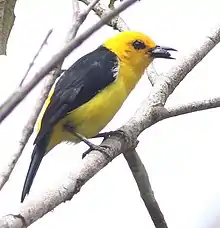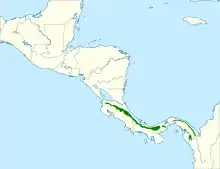| Black-and-yellow tanager | |
|---|---|
 | |
| Scientific classification | |
| Domain: | Eukaryota |
| Kingdom: | Animalia |
| Phylum: | Chordata |
| Class: | Aves |
| Order: | Passeriformes |
| Family: | Thraupidae |
| Genus: | Chrysothlypis |
| Species: | C. chrysomelas |
| Binomial name | |
| Chrysothlypis chrysomelas (Sclater, PL & Salvin, 1869) | |
 | |
| Synonyms | |
|
Tachyphonus chrysomelas (protonym) | |
The black-and-yellow tanager (Chrysothlypis chrysomelas) is a fairly small passerine bird. This tanager is an endemic resident in the hills of Costa Rica and Panama.
Taxonomy and systematics
Most authorities recognize two subspecies: The nominate in Costa Rica and western Panama and C. c. ocularis in eastern Panama, but some recognize the population in Costa Rican and extreme western Panama as a third subspecies, C. c. titanota (then limiting the nominate to the remaining part of western Panama).[2] Some taxonomic lists modified the original name based on gender and use the specific name of chrysomelaena and this emendation is not considered correct.[3]
Description
The adult black-and-yellow tanager is about 12 centimetres (4.7 in) long and weighs 12.5 grams (0.44 oz).[4] The adult male has a bright yellow head, rump and underparts, and a black back, wings and tail. The wing linings are white. The male of C. c. ocularis differs in having a black spot on the lores.[2] The female has olive upperparts and yellow underparts, but in Costa Rica and extreme western Panama (the sometimes recognized C. c. titanota) the throat and lower belly is whitish.[5] She could be mistaken for a warbler or a female yellow-backed tanager.[2] Immatures resemble the adult female.[5]
Vocalizations
The black-and-yellow tanager's call is a scratchy single or repeated tsew, higher and faster than that of the silver-throated tanager.[4]
Distribution
In Panama it has been recorded as far east as the border-region with Colombia, but it has not yet been recorded in the latter country, though it almost certainly occurs.[2] In Costa Rica, the black-and-yellow tanager is found in the foothills and slopes on the Caribbean side of the central mountain ranges, typically from 600 to 1,200 metres (2,000 to 3,900 ft) altitude, and occasionally down to 400 metres (1,300 ft).[4] In Panama, it is found on both the Caribbean and Pacific slope from 450 to 1,200 metres (1,480 to 3,940 ft).[2] The preferred habitat is the canopy of wet forest and tall second growth, but it will feed lower at woodland edges and clearing.
Behavior and ecology
Black-and-yellow tanagers occur in small groups, or as part of a mixed-species feeding flock. This species feeds on small fruit, usually swallowed whole, insects and spiders.
The neat cup nest is built on a tree branch. The eggs are undescribed.[4]
References
- ↑ BirdLife International (2016). "Chrysothlypis chrysomelas". IUCN Red List of Threatened Species. 2016: e.T22722281A94759123. doi:10.2305/IUCN.UK.2016-3.RLTS.T22722281A94759123.en. Retrieved 11 November 2021.
- 1 2 3 4 5 Ridgely and Gwynne (1989). A Guide to the Birds of Panama, with Costa Rica, Nicaragua, and Honduras. ISBN 0-691-08529-3
- ↑ David, N. & Gosselin M. (2002) Gender agreement of avian species names. Bulletin of the British Ornithologists' Club 122:14–49
- 1 2 3 4 Stiles and Skutch (1989). A Guide to the Birds of Costa Rica. ISBN 0-8014-9600-4
- 1 2 Olson (1981). Systematic notes on certain Oscines from Panama and adjacent areas (Aves: Passeriformes). Prov. Biol. Soc. Wash. 94(2): 363-373.
